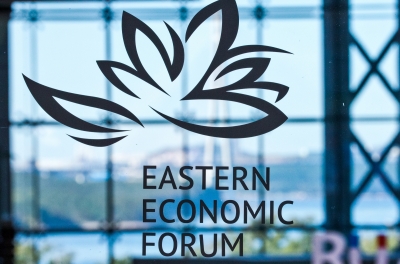Eastern Economic Forum: A Grand Strategic Opportunity for India (Opinion)
By IANS | Updated: August 3, 2022 21:35 IST2022-08-03T21:24:08+5:302022-08-03T21:35:15+5:30
The 7th Eastern Economic Forum (EEF) will take place in Russia's Far Eastern port of Vladivostok from 5-8 September ...

Eastern Economic Forum: A Grand Strategic Opportunity for India (Opinion)
The 7th Eastern Economic Forum (EEF) will take place in Russia's Far Eastern port of Vladivostok from 5-8 September and represents a grand strategic opportunity for India.
These two Great Powers have expanded their special and privileged strategic partnership in an unprecedented manner.
Delhi has decisively acted to become the Kremlin's irreplaceable valve from Western pressure and thus preemptively averted Moscow's potentially disproportionate dependence on Beijing.
This was a game-changer in terms of shaping the contours of the global systemic transition to multipolarity that was accelerated by the Ukrainian Conflict.
The EEF is always a major event in Russia-India relations, but this year it is more important than ever due to a larger context.
Russia urgently needs to diversify from its hitherto disproportionate economic dependence on the EU towards the Global South, and India has been designated its priority partner in this respect.
They've already revived the International North-South Transport Corridor (INSTC) through their shared Iranian strategic partner and have thus come to align their grand strategies in Eurasia, which is a major accomplishment.
It is now time to do the same in the Indo-Pacific by taking maximum advantage of the EEF to that end.
The Vladivostok-Chennai Maritime Corridor (VCMC) that was jointly announced by Russian President Vladimir Putin and Indian Prime Minister Narendra Modi during the latter's appearance at the EEF in September 2019 as the guest of honor creates the geo-economic basis for bringing this about, but implementation was unexpectedly delayed as a result of the Covid pandemic several months later.
Nevertheless, there's no better time than now for reviving the VCMC exactly as the INSTC was recently revived, which will align their Indo-Pacific grand strategies and thus enable them to more effectively shape the emerging Multipolar World Order in the Eastern Hemisphere.
The whopping 99-paragraph Partnership for Peace, Progress, and Prosperity that was agreed to during President Putin's visit to Delhi in December 2021, which importantly was his first trip abroad since the pandemic began apart from his brief meeting with the US President Joe Biden in Geneva earlier that summer, provides a detailed action plan for implementing this vision.
Paragraphs 31-34 in particular explain how they hope to accomplish this in the Far East while paragraph 42 did the same when it came to the INSTC, the vision of which has already achieved tangible dividends as was earlier explained. It's now incumbent on both Great Powers to revive the VCMC during next month's EEF.
The bulk of bilateral trade between Russia and India concerns arms and energy, the latter of which has surged by over fifty times since Moscow began selling Delhi discounted oil after the start of its special military operation in Ukraine.
Natural resources, however, should be but a single part of more comprehensive economic relations between these rising Great Powers. Influential Russian businessman Oleg Deripaska recently told the Economic Times that he envisions his country's trade with India replacing its lost trade with Europe, but economic ties must urgently diversify in order for that to happen, and it'll take a lot of time for that to occur.
Therein lies the importance of next month's EEF since India can double down on the Russian dimension of its multipolar grand strategy to make inroads in its partner's resource-rich and geostrategically positioned Far Eastern region.
The VCMC will predictably have a major resource component to start off with, but it mustn't remain limited only to trade in that sphere. Rather, flagship projects can serve as magnets for attracting other investments in different industries as Indian entrepreneurs build upon prior successes to truly making themselves an economic force to be reckoned with in this part of the Indo-Pacific.
Russia needs major investments in the Far East in order to have a more solid basis upon which to build the geo-economic dimension of its Indo-Pacific strategy. China's already a key player in that part of the country but the Kremlin pragmatically wants to preemptively avert any potentially disproportionate dependence on the People's Republic there just like it hopes to do in general like was earlier explained.
Japan and the Republic of Korea were once considered to be promising partners for diversifying Russia's development of the Far East but those two are reluctant to offend their American military ally by expanding trade with Moscow after the Ukrainian Conflict.
India therefore does not have much competition there in this respect since Delhi has already proven that it won't unilaterally concede on its objective national interests related to its special and privileged strategic partnership with Russia.
India as a civilization-state should therefore prioritize the creation of a comprehensive joint actionplan for developing the Russian Far East, one which might begin with expanding energy and other resource cooperation but will inevitably evolve into other domains including academic, industrial, merchant, and tourist cooperation, et al.
Disclaimer: This post has been auto-published from an agency feed without any modifications to the text and has not been reviewed by an editor
Open in app